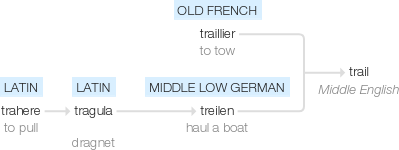Trail
Middle English (as a verb): from Old French traillier ‘to tow’, or Middle Low German treilen ‘haul a boat’, based on Latin tragula ‘dragnet’, from trahere ‘to pull’. Compare with trawl. The noun originally denoted the train of a robe, later generalized to denote something trailing.
wiktionary
From Middle English trailen, from Old French trailler(“to tow; pick up the scent of a quarry”), from Vulgar Latin *tragulāre(“to drag”), from Latin tragula(“dragnet, javelin thrown by a strap”), probably related to Latin trahere(“to pull, drag along”).
etymonline
trail (v.)
c. 1300, "to hang down loosely and flow behind" (of a gown, sleeve, etc.), from Old French trailler "to tow; pick up the scent of a quarry," ultimately from Vulgar Latin *tragulare "to drag," from Latin tragula "dragnet, javelin thrown by a strap," probably related to trahere "to pull" (see tract (n.1)). Transitive sense of "to tow or pull along the ground" is from c. 1400. The meaning "follow the trail of" (an animal, etc.) is first recorded late 14c. Meaning "to lag behind" is from 1957. Related: Trailed; trailing.
trail (n.)
early 14c., "trailing part of a robe, gown, etc.," from trail (v.). The meaning "track or smell left by a person or animal" is also from 1580s. Meaning "path or track worn in wilderness" is attested from 1807. Trail of Tears in reference to the U.S. government's brutally incompetent Cherokee removal of 1838-9 is attested by 1908.
